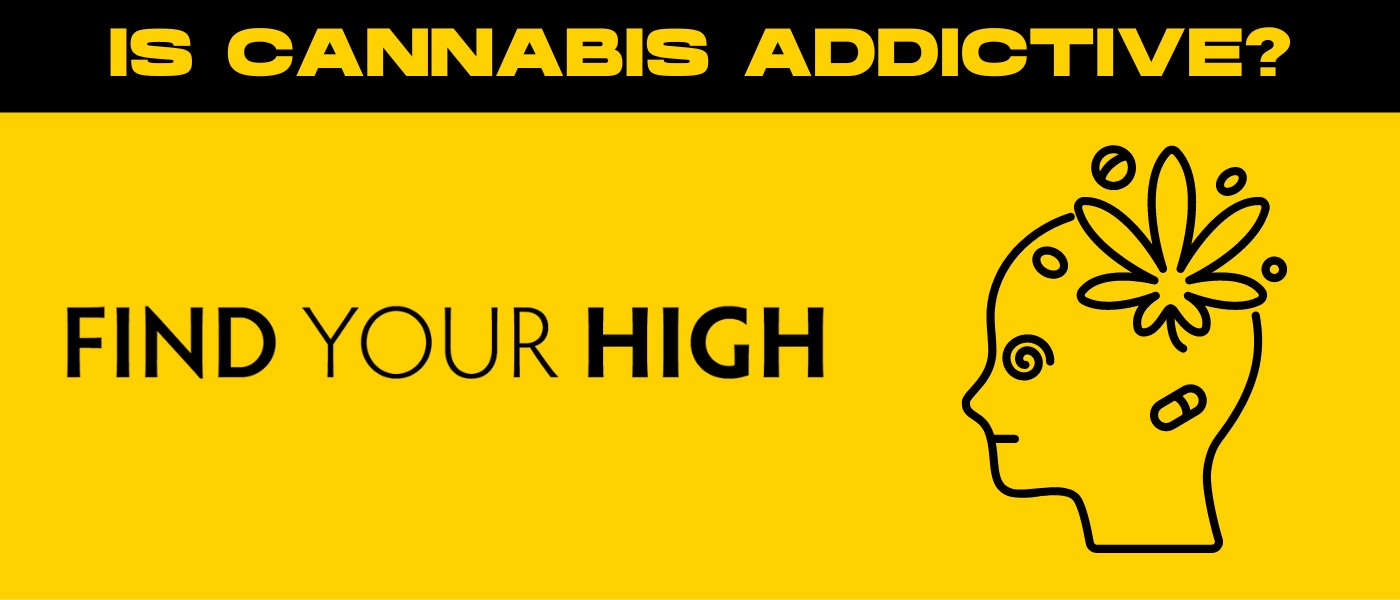If you attended middle school between the years of 1983-2009, then you most likely completed the D.A.R.E program. If not, we’ll catch you up to speed; basically, a police officer taught ‘Drug Abuse Resistance Education’ to classrooms all across the country. We vaguely remember something about a required essay and a lion mascot, but we’ve clearly blocked out most of our D.A.R.E program experience.
Needless to say, the program wasn’t as successful as originally thought because while we may have sworn off drugs in fifth grade, here we are… purchasing (and selling) legal weed for doorstep delivery and living our best stoner lives. But is weed really even considered a drug? The answer to that question leads us to our next point:
Is cannabis addictive?
If you or your mom ever Googled this question, then you’re not alone. In this blog, we’ll be discussing whether or not marijuana is addictive, the difference between addiction and dependency, how to recognize weed addiction, and finally, treatments and remedies to marijuana addiction.
Let’s get into it.
Is Marijuana Addictive?
Short answer, yes; however, it’s not like other narcotics considered to be Schedule 1 drugs and isn’t associated with overdose death.
Cannabis addiction is more commonly referred to as Marijuana Use Disorder, and while an argument can be made against the federal legalization of weed in regards to its addictive nature, most cannabis consumers don’t become addicted. Those who do, typically began consuming during their adolescent ages.
According to the CDC, approximately 3 in 10 people who consume cannabis become addicted; however, another study by the CDC estimates that those who use cannabis only have about a 10% chance of developing marijuana use disorder. That said, stats are low and chances are, you won’t develop an addiction.
While most people argue that weed isn’t necessarily a ‘drug,’ it is a substance that undeniably alters your mood and in turn, can become addictive by nature. In order to truly understand marijuana addiction, it’s essential to understand drug abuse terminology, which leads us to our next point…
Addiction vs. Dependence
Yep, there’s a difference between addiction and dependence. While it can be tricky to decipher, the Addiction Center breaks it down pretty easily by stating, “Addiction is marked by a change in behavior caused by the biochemical changes in the brain after continued substance abuse.” Whereas, dependence typically refers to a physical dependence on a substance and is “characterized by the symptoms of tolerance and withdrawal.” Additionally, addiction is diagnosable, dependency is not.
So, where are we going with this?
It’s important to recognize the difference between addiction and dependence in order to better understand that one may be dependent on marijuana, but not addicted to it. They may require their daily smoke sessions, but they don’t neglect social, work, or family responsibilities to do so. They may be irritable without hitting their favorite cartridge, but their dependency is not characterized by a “chronic brain disease caused by brain circuitry, genetics, social environment, and life experiences,” as with addiction, according to WebMD.
However, it’s extremely important to note that while addiction and dependency are NOT one in the same, dependency often leads to addiction.
Recognizing Weed Addiction
The following signs may indicate marijuana use disorder:
- Inability to commit to social, work, or family responsibilities
- A loss of interest in recreational activities as well as setting and achieving goals
- Inability to quit consuming cannabis
- Increased tolerance
- Experiencing withdrawal symptoms in some cases (However, many experts note that cannabis withdrawal does not have traditional withdrawal effects, which furthers the argument that weed does not have the typical side effects of an ‘addictive substance’ and is therefore not characterized as such.)
Please note that one can regularly consume weed, even on a daily basis, and not be dependent or addicted. Weed is a beautiful thing, and we’ll be the first to recognize that.
Our Takeaway on Marijuana Use Disorder
Sure, marijuana can be addictive or foster dependency; however, it’s really not common. If you enjoy smoking on a daily basis and cannabis doesn’t keep you from living your life to the fullest—or even adds to your life in beneficial or medicinal ways—then regular consumption most definitely is not a negative thing.
From experience, marijuana has a number of benefits that simply make lives better. From treating insomnia and relieving muscle tension to anxiety relief and a boost of energy, marijuana is an incredible plant with a number of pro’s, and we feel honored to offer the best of the best to our customers.
However, if you or somebody you know is noticing a much higher tolerance or any of the symptoms associated with marijuana use disorder mentioned above, we encourage you to seek help or begin by taking a tolerance break.






